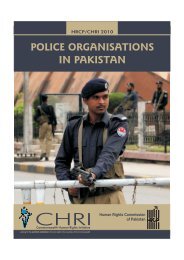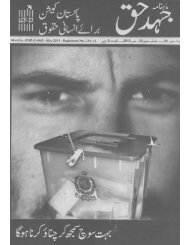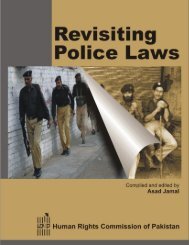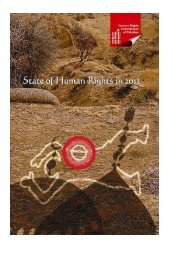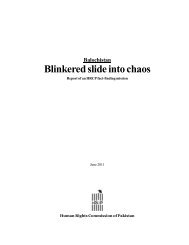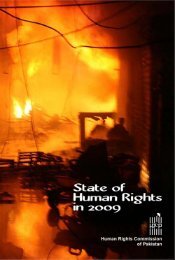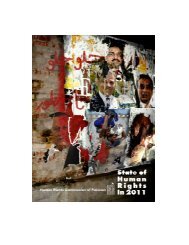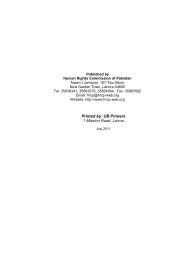Download PDF file - HRCP
Download PDF file - HRCP
Download PDF file - HRCP
You also want an ePaper? Increase the reach of your titles
YUMPU automatically turns print PDFs into web optimized ePapers that Google loves.
<strong>HRCP</strong> fact-finding missions’ report 41<br />
In the case of Balochistan, there are undoubtedly unresolved political issues. An absence of dialogue<br />
has given way to brute force on all sides. Baloch nationalists see the expansion of military presence in the<br />
province as an ominous sign. They feel the urgency to claim their stake in the natural resources of the Province.<br />
On the other hand, the government is adamant about going ahead with its plans on development under the<br />
direct supervision and patronage of the military. This serious conflict of interests, at a critical moment—where<br />
the military is desperate for resources and the Baloch nationalists fear they are losing out for good—needs to<br />
be resolved by the intervention of honest brokers.<br />
The parliamentary commission on Balochistan, which was established in September 2004 in an attempt<br />
to resolve the crisis in the province, could have played this role. However, even the recommendations it made,<br />
in an interim report submitted to the Senate in September 2005 after various meetings with Baloch tribal<br />
leaders and politicians, have gone largely unheeded. These recommendations included the withdrawal of the<br />
Frontier Constabulary and coastguard from interior Balochistan, the payment by the federal government of all<br />
arrears on gas royalties and the shifting of the head office of the Gwadar Port Authority (GPA) from Karachi to<br />
Gwadar and attention to addressing the issues of poverty and under-development in Balochistan. Criticism of<br />
the composition of the commission by opposition parties, and a distancing from the stands taken by it by some<br />
Baloch leaders, adversely affected the credibility and standing of the commission.<br />
Law and order<br />
Balochistan has 26 districts. In terms of policing the province is divided into category ‘A’ and ‘B’. The<br />
‘A’ areas consist mainly of towns and cities and remains under a regular police force. There are 89 police<br />
stations and the sanctioned strength of the police is 19,145. The Balochistanis complain that the head of the<br />
police force—a provincial subject—is invariably a non-Balochistani. They also complained the Governor was<br />
from outside the province.<br />
The ‘B’ area (almost 95% of Balochistan) is under the control of the Levies who maintain 286 thanas<br />
and employ 13,357 personnel. According to the statistics available, the crime rate in ‘A’ area is comparatively<br />
lower than in “B” area managed by the Levis. The government plans to merge the Levies force with the police<br />
force. Presently, the recruitment of Levies is not based on merit, but on the recommendation of the “local<br />
influentials”. 21<br />
The conversion of the Levies into the police force has also become controversial. Many Balochistan<br />
imembers of the parliament expressed fears of rising unemployment amongBalochistanison being relieved from<br />
the Levies force. The government has, however, assured them that the Levis will be trained and inducted into<br />
the police force. They further hope to provide 6,000 jobs for local inhabitants in the Balochistan Constabulary,<br />
being raised for policing purposes.<br />
The Frontier Corps (FC) works under the Federal Interior ministry. It is a paramilitary force. It controls<br />
smuggling, law and order and drug trafficking. According to the authorities 24% of the FC is from Balochistan.<br />
In theory the provincial Home Department requests the Interior ministry of the central government to come to<br />
the aid of the provincial government. However, given the highly centralized system of governance in Pakistan,<br />
the Centre takes the decision and the Provinces simply back it.<br />
A bone of contention and bitterness are the check posts established by the security and law enforcement<br />
agencies. The FC has set up 493 check posts. A vast number of citizens in Balochistan have complained of<br />
abuses by those running these posts. The complaints range from extortion, humiliation, threats and outright use<br />
of lethal force without any provocation.<br />
According to the Frontier Corps Ordinance 1959, the FC is deemed to be in “active service” against<br />
external aggressor or enemy, against hostile tribes, raiders or other hostile persons, or persons co-operating



